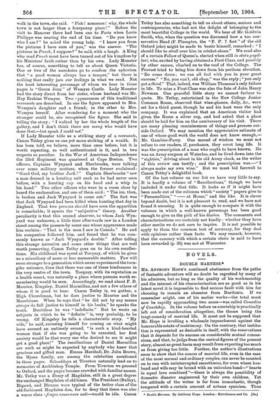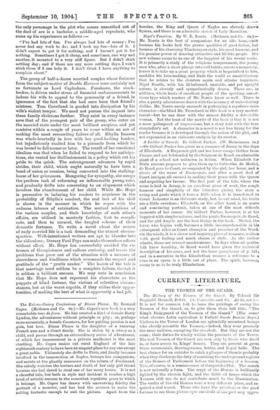Mn. ANTHONY HOPE'S continued abstinence from the paths of fantastic
adventure will no doubt be regretted by many of his admirers, but so long as the quality of his workmanship and the interest of his characterisation are as good as in his latest novel it is impossible to find serious fault with him for choosing to remain an absentee from Ruritania. If we remember aright, one of his earlier works—the total must now be rapidly approaching two score—was called Comedies of Courtship. In the volume before us courtship is practically left out of consideration altogether, the theme being the tragi-comedy of married life. It must not be supposed that Mr. Hope is levelling a wholesale impeachment against the honourable estate of matrimony. On the contrary, that institu- tion is represented as desirable in itself, with the reservations that it depends for its success on considerable mutual conces- sions, and that, to judge from the central figures of the present story, almost as great harm may result from expecting too much as from giving too little. Further, the author's illustrations seem to show that the course of married life, even in the case of the most normal and ordinary couples, can never be counted on to run with uninterrupted smoothness, for even where hus- band and wife may be bound with an unbroken bond—" hearts in equal love combined "—there is always the possibility of domestic disaster engineered by their own children. Yet the attitude of the writer is far from iconoclastic, though tempered with a certain amount of urbane cynicism. Thus • Double Harness. By Anthony Hope. London: Hutchinson and Co. Da]
the only personage in the plot who comes unscathed out of the duel of sex is a bachelor, a middle-aged reprobate, who sums up his experiences as follows :—
"I've had lots of fun. I've always had lots of money ; I've never had any work to do; and I took my fun—lots of it. I didn't expect to get it for nothing, and I haven't got it for nothing. Sometimes I got it cheap, and sometimes, one way and another, it mounted to a very stiff figure. But I didn't shirk settling day ; and if there are any more settling days, I won't shirk them if I can help it. I don't think I have anything to complain about."
The group of half-a-dozen married couples whose fortunes form the subject-matter of Double Harness were certainly not so fortunate as Lord Caylesham. Fanshawe, the stock- broker, is driven under stress of financial embarrassments to induce his wife to appeal to the generosity of a friend, in ignorance of the fact that she had once been that friend's mistress. Tom Courtland is goaded into dissipation by his wife's violent temper. We need not pursue the inquest into these family skeletons further. They exist in every instance save that of the youngest pair of the group, who enter on the married state under the most brilliant auspices, and yet contrive within a couple of years to come within an ace of making the most resounding failure of all. Sibylla Imason was whole-heartedly in love with her good-looking banker, but injudiciously exalted him to a pinnacle from which he was bound to fall sooner or later. The result of her emotional idealism was that when he failed to respond to her anticipa- tions, she vented her disillusionment in a policy which cut his pride to the quick. The estrangement advances by rapid strides, their child, which ought naturally to have been a bond of union or reunion, being converted into the stalking- horse of her grievances. Hungering for sympathy, she essays the perilous task of reforming an inflammable young rake, and gradually drifts into consenting to an elopement which involves the abandonment of her child. While Mr. Hope is persuasive in inducing his readers to acquiesce in the probability of Sibylla's conduct, the real test of his skill is shown in the manner in which he copes with the arduous labours of extrication. The mutual relations of the various couples, and their knowledge of each other's affairs, are utilised in masterly fashion, first to compli- cate, and then td unravel, the tangled scheme of their domestic fortunes. To write a novel about the course of early married life is a task demanding the utmost circum- spection. Well-intentioned writers are apt to blunder into the ridiculous ; literary Paul Prys can make themselves odious without effort. Mr. Hope has successfully avoided the ex- tremes of Gampishness and callous curiosity, and treats the problems that grow out of the situation with a mixture of shrewdness and kindliness which commands the respect, and gratitude of the "gentle reader." The lesson of the tale is that marriage need seldom be a complete failure, though it is seldom a brilliant success. We may note in conclusion that Mr. Hope does not represent his characters as the puppets of blind fortune, the victims of relentless circum- stances, but at the worst capable, if they utilise their oppor- tunities, of making the best of what is apparently a bad job.



































 Previous page
Previous page